We're 100% independent
Find the top Canadian online casinos
Get the biggest welcome bonuses
We're 100% independent
Find the top Canadian online casinos
Get the biggest welcome bonuses
Football betting captivates millions around the globe, combining the excitement of the sport with the thrill of wagering.
As the popularity of football continues to soar, enthusiasts are eager to dive into the world of betting, seeking strategies to enhance their understanding and potentially their winnings.
Understanding the various facets of football betting is essential for both newcomers and seasoned bettors alike. From different types of bets, such as moneyline and point spread wagers, to the intricate workings of odds, being well-informed is the key to making smarter choices.
Additionally, factors like team statistics, injury reports, and even weather conditions can significantly impact betting outcomes.
In this ultimate guide, we’ll explore the essential strategies and tips for successful football betting. Whether you're a fan looking to enhance your game-day enjoyment or an aspiring bettor aiming to maximize your profits, this article will pave the way for a more informed betting experience.
Football gambling has become a staple of sports culture, enticing fans with the thrill of risk and reward. Understanding the different types of bets and strategies is essential for both novice and seasoned bettors.
Here’s a comprehensive guide to help you navigate the world of football betting.
Football betting attracts a diverse group of individuals eager to engage with the sport beyond passive viewing. Bettors, ranging in age from 18 to 21 and above, place wagers through both physical and well reviewed online sportsbooks like Jackpot City or Spin City.
The regulations regarding legal betting age differ across the Canada, with most provinces setting a minimum age of 19, while a few permit sports betting at 18.
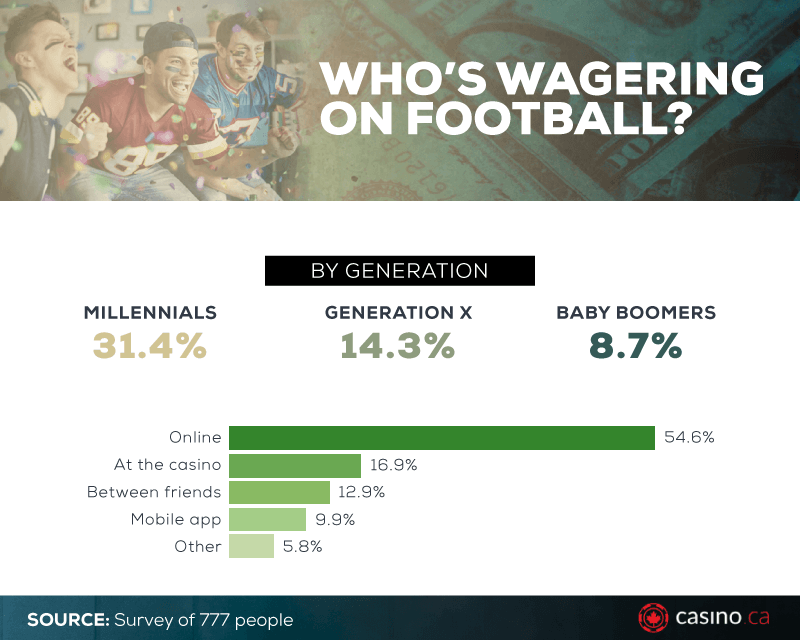
Bettors are drawn to football gambling for the thrill and the potential payout associated with correctly predicting game outcomes. Online sportsbooks play a critical role in this ecosystem, offering various types of sports bets, including spread bets and moneyline bets.
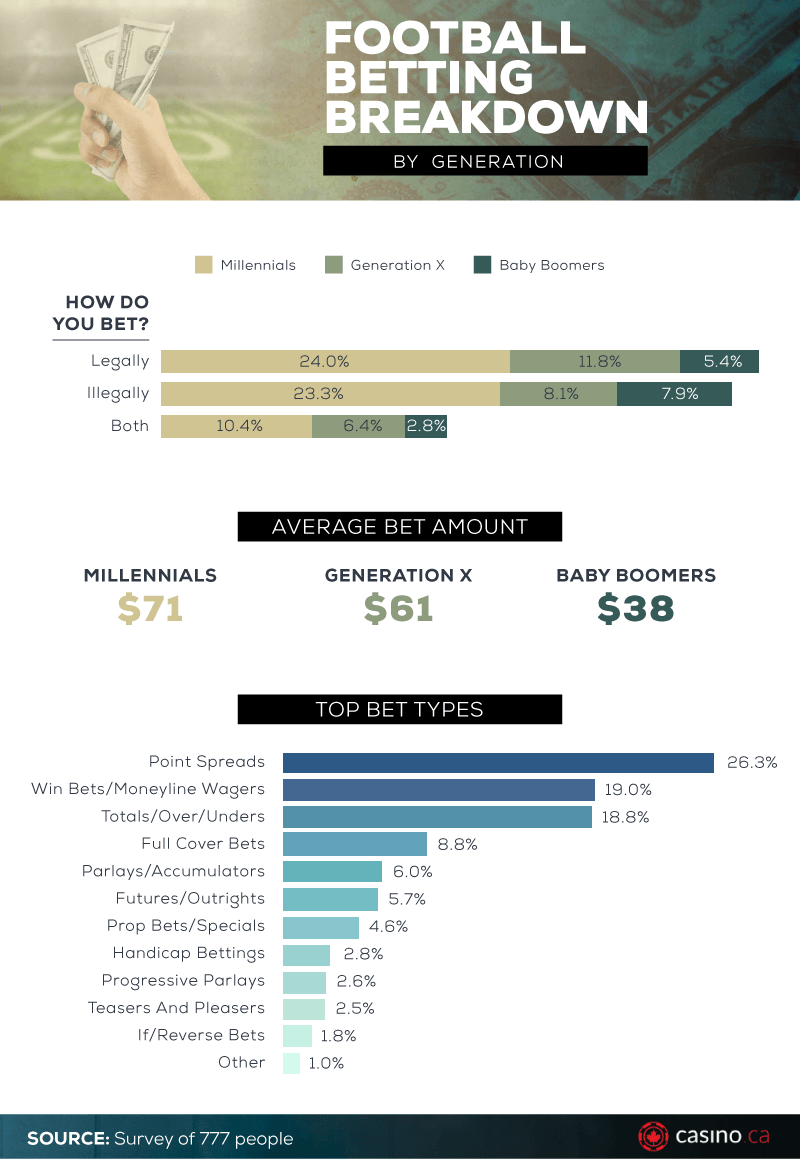
Betting on football not only adds excitement to watching the games but also provides an opportunity to utilize betting strategies for potential winnings.
Football betting offers a range of betting options that cater to different risk levels, knowledge, and betting styles. Understanding these types of bets can significantly enhance a bettor’s strategy and potential for success.
Moneyline bets are straightforward and ideal for beginners. In this type of wager, the bettor simply chooses which team will win the game. The odds are presented with a negative number for the favorite, indicating the amount one needs to bet to win $100.
Conversely, the underdog is represented by a positive number, indicating the amount the bettor would win on a $100 wager. For example, a -200 moneyline on a favorite means a $200 bet would net a $100 profit.
The simplicity of moneyline bets makes them appealing to many football enthusiasts looking to place a bet with Sportsbooks like PointsBet.
Point spread bets introduce a challenge by leveling the playing field between two teams of unequal strength. The favorite must win by more than the point spread to secure a bettor’s victory.
Conversely, the underdog must either win outright or lose by less than the spread. Typically featuring odds of 11 to 10, this bet type demands a $11 risk for a chance to win $10.
It's common across major leagues like the NFL and designed to create balanced betting markets and excitement in every game outcome.
Also known as total bets, over/under wagers focus on the combined score or specific statistics of a game. Bettors predict whether the total points scored will be over or under a number pre-set by oddsmakers.
This type extends beyond the game’s final score, including wagers on individual metrics like a quarterback’s passing yards. Betting "over" anticipates a higher total score or statistic, while "under" bets predict a lower total.
The versatility of over/under bets allows bettors to engage with games without needing to choose a winner.
Parlay bets consist of combining multiple individual wagers into a single bet. While requiring all selections to win, parlays offer a high-risk, high-reward opportunity, as the potential payout is determined by the combined odds of all bets placed.
Same Game Parlays allow bettors to combine multiple outcomes within a single matchup for potential larger returns.
However, these bets demand accuracy across all selections, making them challenging but rewarding for experienced bettors.
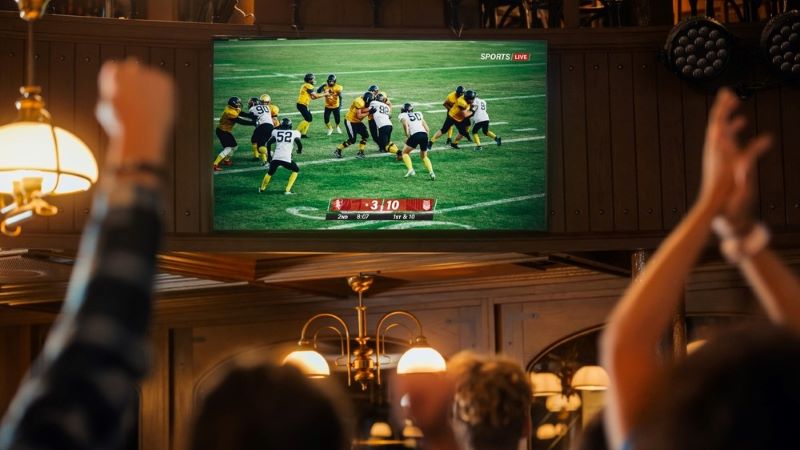
Image credit: Gorodenkoff/Shutterstock
Prop bets, or propositional bets, focus on specific elements of a football game rather than the final result. These can involve individual player performances, such as over/under passing yards for a quarterback, or specific events within the game, like the total number of field goals scored.
Prop bets are particularly popular during significant events like the Super Bowl, where hundreds of options are available. With varied formats, including yes/no propositions and segmented game bets, props add an entertaining and strategic dimension to sports wagering.
Each type of bet carries its own set of rules and potential outcomes. Understanding these can enhance betting strategies and enjoyment of football games.
Whether engaging casually or with a strategic plan, football betting adds an exciting layer of interaction to this beloved sport.
Betting odds are a fundamental component in sports betting, serving as a reflection of the likelihood of a particular outcome and dictating the potential payouts for a bettor.
These numerical expressions help bettors understand not only the probability of an event but also their possible winnings.
Sportsbooks use different types of odds—American, Decimal, and Fractional—to present this information in various formats, each with its unique way of calculation and interpretation.
Regardless of the format chosen, odds guide bettors through the betting market by indicating both the implied probability of an outcome and the amounts they could potentially win if their bets are successful.
American Odds, commonly referred to as "moneyline odds," are a prevalent format in the United States. They use positive and negative numbers to portray betting scenarios. Negative numbers, such as -110, indicate the favorite in a matchup, signaling how much a bettor would need to risk to gain a $100 profit.
For instance, a -110 odds mean you must wager $110 to win a $100 profit. On the other hand, positive numbers, like +110, reflect the underdog status and the potential profit from a $100 stake. In this scenario, betting $100 at +110 odds could yield a $110 profit.
These odds illuminate the risk and reward aspects of a bet, with sportsbooks adjusting them based on their assessment of team strengths and the volume of bets laid down.
Decimal odds simplify the betting process by showing the total payout per dollar wagered. This format is popular in Europe, Australia, and Canada due to its straightforwardness. To determine the total potential return, you can multiply your original stake by the decimal odds.
For example, if you place a $10 bet on odds of 3.00, your total return would be $30, which includes your original $10 stake plus a $20 profit. The implied probability of winning can be quickly assessed with decimal odds using the formula: Implied Probability = 1 / Decimal Odds.
This easy-to-understand format is particularly favorable for those new to sports betting, making calculations simple and transparent.
Fractional odds are traditional in the UK and Ireland, presenting the potential profit in relation to the stake. They are typically expressed in ratios, such as 6/1 or 9/5. The numerator (first number) represents how much you will profit, while the denominator (second number) indicates the stake.
For example, 3/1 odds mean that for every $1 wagered, you stand to win $3, along with the return of your original stake. To compute the implied probability, divide the denominator by the sum of both numbers.
For Gennady Golovkin’s odds of 8/13, the winning probability is 61.9%. Fractional odds can appear intimidating at first, but they effectively convey the betting ratio and potential profits while contrasting the likelihood of success versus failure. This format can be displayed with a solidus (/) or a vertical stack for clarity.
By understanding these types of odds, sports bettors can better navigate the complexities of legal sports betting, making informed decisions on potential wagers and maximizing their potential payouts.
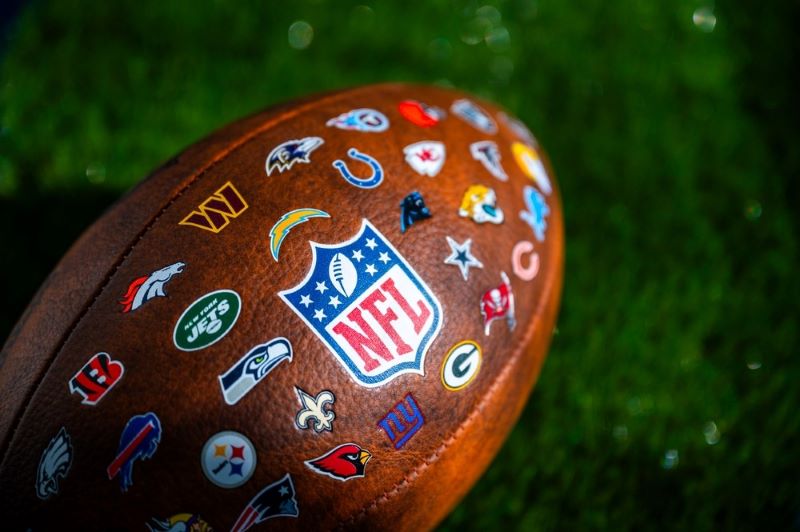
Image credit: Kovop/Shutterstock
Betting slips hold crucial information for any bettor, detailing the football gambling activities they've opted into. Generally, these slips display the event date, bet type, selection, odds, stake amount, potential return, and the availability of a cash-out option.
In the case of multiple bets like Doubles or Trebles, all selections must win for the bettor to receive the indicated potential return. The checkbox for an ‘Each-Way’ or ‘E/W’ bet means the stake is doubled to cover both an outright win and a place at reduced odds.
Understanding odds is key. For instance, odds displayed as “8/1” indicate that if you bet $10, your total return would be $90. This includes the original stake of $10 and the $80 winnings.
A valuable feature is the cash-out option. The amount available to cash out can change based on live game circumstances, so it might differ from the potential return originally noted.
Here’s a quick list of what to check on a betting slip:
Understanding these elements can significantly enhance your football gambling strategy.
Engaging in football gambling can be thrilling, but achieving success requires sound strategies and a disciplined approach.
Implementing effective betting strategies involves understanding different aspects like bankroll management, pre-game analysis, and market dynamics to make informed decisions. Here's a detailed look into these strategies.
Line shopping is a critical element of successful sports betting. It involves comparing and contrasting odds and spreads offered by various sportsbooks to ensure you secure the best possible deal.
Odds trackers can assist bettors in identifying the most favorable odds and prices from major online sportsbooks, thereby maximizing potential returns.
Small differences in odds can significantly impact your overall return on investment (ROI). For instance, if Sportsbook B offers Giants +7.5 while Sportsbook A provides the same at +7, opting for Sportsbook B might yield a higher return on a $100 wager.
This highlights the importance of exploring different betting markets to find advantageous odds and spreads and improve your chances of a big win.
Key numbers, notably 3 and 7, are pivotal in football gambling as they represent common victory margins in NFL games.
Many matches are often decided by these specific point totals, making them crucial for bettors. Spreads structured around these numbers, such as -2.5, -6.5 for favorites, and +3.5, +7.5 for underdogs, can present lucrative opportunities.
Line movements around these numbers can indicate a higher probability of a final score being resolved by such margins. In particular, betting on favorites at -6.5 or underdogs at +7.5 is significant since these points influence the value and effectiveness of point spreads.
Long-term success in sports betting is largely dependent on prudent bankroll management. This involves treating your gambling funds as an investment rather than reckless spending.
A popular method is the unit system, where a fixed percentage of the bankroll is wagered per bet. Generally, it's advisable to stake between 1% to 2% of your bankroll on each wager, such as $10 or $20 if your bankroll is $1,000.
The amount wagered should factor in various elements, including the likelihood of the bet succeeding, personal risk tolerance, and the overall bankroll.
Employing effective bankroll management helps prevent significant losses by ensuring you never stake more than you can afford to lose. This strategy fosters a responsible betting approach and enhances the potential for sustained success.
Betting on fantasy football with sportsbooks like DraftKings or FanDuel combines the excitement of traditional sports wagering with the strategic depth of fantasy leagues. Here’s a quick guide:
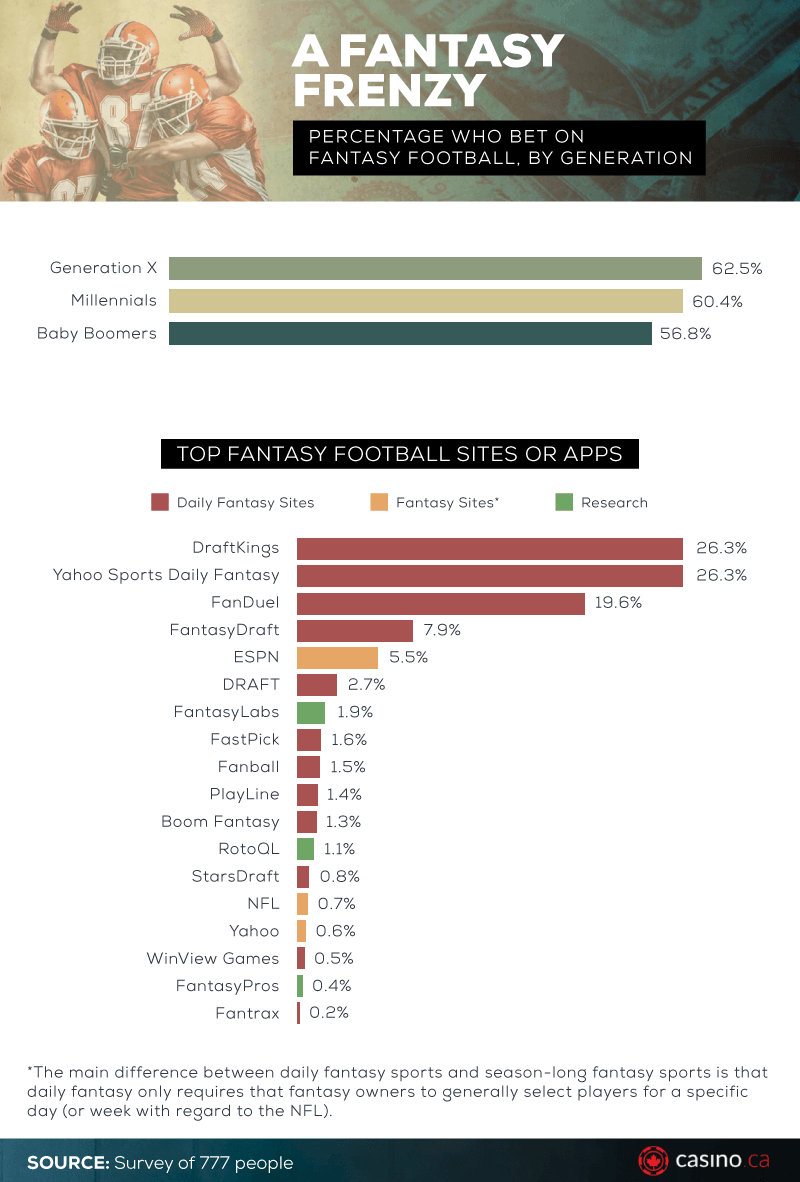
Fantasy football betting offers a variety of wager types, enabling bettors to use different betting strategies. Whether you're a seasoned sports bettor or new to legal sports betting, exploring these options can add layers of strategy to your football experience.
In the realm of football gambling, understanding the different betting markets is key to making informed wagers. Among the most basic and popular methods is point spread betting.
In this market, a favored team must win by a specified number of points to "cover the spread."
For example, in NFL spread betting, a popular gambling style, one team is designated as the favorite, indicated by negative odds, while the underdog is represented with positive odds.
The odds for these point spread bets are typically offered at 11 to 10, meaning a bettor needs to wager $11 to win $10, reflecting customary betting increments. This structure provides a straightforward approach for both novice and experienced bettors.
Another common type of bet is the NFL total or Over/Under, in which you wager on whether the combined score of both teams will exceed or fall short of a predetermined total set by the sportsbook.
Finally, the moneyline bet offers a straightforward method of betting on NFL games, where bettors simply pick the outright winner, with odds indicating each team’s implied probability of victory.
Futures betting is an exciting market where wagers are placed on events that will occur in the future, typically revolving around season outcomes or championships. For instance, bettors can place bets predicting which team will win a championship or whether a team will exceed a set win total for the season.
The odds for futures bets are generally expressed as a ratio. This indicates the potential payout relative to the wager amount, such as a 50–1 payout for a team to win the Super Bowl.
Futures wagers can often yield the best potential payout when made before a season begins, though they remain available throughout the year with odds decreasing as the season progresses.
It's important to remember that winning bets on futures are settled only at the conclusion of the respective events, like the Super Bowl, even though losing bets can be closed out earlier.
Live betting, also known as in-game wagering, offers a dynamic and real-time betting experience as it allows bettors to place wagers while a game is ongoing. The odds in live betting are dynamically changing based on current game events, allowing bettors to adjust their strategies in real time.
This flexibility enables bettors to capitalize on favorable odds during key game moments, but it requires quick decision-making and an in-depth understanding of both the sport and betting process.
With numerous markets available for wagering during a football match, live betting includes options such as match results, half-time scores, and specific player achievements like goal scoring.
However, the rapid pace of live betting can lead to impulsive decisions, potentially influenced by emotions rather than strategic analysis. Thus, bettors need to strike a balance between intuition and analytical thinking to succeed in this fast-paced environment.
Understanding these distinct betting markets, from traditional point spreads to dynamic live wagering, can vastly enhance a sports bettor's experience while minimizing risks associated with impulsive betting habits.

Image credit: Brocreative/Shutterstock
Analyzing NFL team statistics is a crucial aspect of successful sports betting. Bookmakers meticulously study team and player statistics, along with historical data and league trends, to set competitive odds.
Bettors often use projections to uncover inefficiencies in betting markets, especially for spread bets. This involves analyzing team performance and spotting disparities in odds.
Advanced metrics such as Expected Goals (xG) in soccer and Player Efficiency Rating (PER) in basketball provide deep insights, but they should not be relied on exclusively. Balancing these metrics with other factors offers a more comprehensive view.
Evaluating the risk-to-reward ratio is key when analyzing statistics. Focusing solely on likely winners can result in missed opportunities for value betting. A critical strategy is to assess potential payouts compared to the implied probability and risk involved.
Here's a simple checklist for analyzing team statistics:
A balanced approach, considering various metrics and factors, enhances the accuracy of predictions in sports betting.
Understanding the importance of injury reports is crucial for anyone involved in sports betting, particularly when it comes to NFL spreads and totals. Injuries can significantly influence both the odds and outcomes of games.
Quarterback injuries are especially impactful, often leading to substantial shifts in betting lines. Similarly, injuries to star players such as running backs and receivers can affect the spreads.
It's also vital to notice cluster injuries, especially in key positions like offensive linemen or the defensive secondary. These can provide valuable insights into potential game outcomes. Keeping track of the latest injury news, which might be released mere days or hours before kickoff, is essential for making informed betting decisions.
Monitoring injury reports helps in evaluating individual players and understanding broader team dynamics. This, in turn, can indicate potential changes in team performance. It’s also worth noting that the absence of a coach, through injury or illness, can have a significant impact on a team’s performance.
By staying informed about injuries, bettors can make better decisions and potentially increase their chances of profitable sports wagers.
When it comes to football gambling, evaluating weather conditions plays a critical role in making informed betting decisions. Weather factors such as rain, snow, and particularly wind can significantly impact the outcome of an NFL game.
Wind is the most disruptive element, affecting both passing and kicking performance more than other weather conditions like rain or snow.
As the autumn months usher in colder temperatures and potential precipitation, especially in northern cities with outdoor venues, it's crucial for bettors to keep track of the weekly weather forecast. These conditions can alter playing dynamics, favoring certain teams or affecting game strategies.
Here are key weather factors to consider for NFL betting:
Understanding how these elements can change the dynamics of a football game is essential for evaluating potential wagers. By staying informed about weather conditions, bettors can improve their chances of making successful bets.
Risk management is a crucial aspect of successful betting that involves several strategies to ensure competitiveness and profitability. Bookmakers set odds by analyzing statistical data, expert opinions, betting patterns, and using comprehensive risk management strategies.
They fine-tune these odds by considering factors like historical performance, player injuries, and league contexts. This careful analysis helps sportsbooks manage risk effectively, ensuring balanced and appealing betting markets.
Live betting presents an opportunity for bettors to capitalize on momentum swings, as it allows for real-time assessment and risk adjustments based on changing conditions within a football game. Managing risk effectively also involves choosing the right time to place wagers, especially during line movements, to secure the most favorable odds.
To assist bettors in maintaining control over their betting risks, betting platforms offer valuable tools such as budget limits and self-exclusion options. These features help bettors manage their gambling activity responsibly and avoid potential pitfalls.

Image credit: EFKS/Shutterstock
Setting limits is fundamental to responsible gambling and acts as a protective measure against potential financial strain.
Establishing a realistic budget that you can afford is a crucial initial step. It's equally important to set a time limit on gambling activities and adhere to it. This helps maintain control and prevents gambling from becoming a disruptive element in one’s life.
Avoiding the temptation of placing large bets with hopes of big wins is essential, as this approach can lead to financial difficulties. Additionally, chasing losses—trying to win back lost money through more betting—can initiate a dangerous cycle, leading to further losses.
Most sportsbooks offer tools for players to set budgets, limits, and implement cool-off periods, which are vital for supporting responsible gambling behaviors. Leveraging these tools helps ensure that gambling remains an enjoyable pastime rather than a source of stress.
Avoiding emotional betting is critical for making informed and rational decisions. One of the best tips for new sports bettors is knowing when to stop and not giving in to the temptation of chasing bets to make up for past losses. Emotional wagering often leads to poor decisions, as it lacks the grounding in proper research and analysis.
Bettors should aim to remain objective by focusing on statistics and unique circumstances associated with a game, rather than letting personal loyalty to a team influence their wagers. This objectivity is crucial when considering factors such as moneyline bets, spread bets, or prop bets.
Setting realistic budgets not only protects against financial strain but also helps avoid impulsive decisions, particularly after consecutive losses. Chasing higher payouts, driven by emotional highs or lows, can lead to increased risks and disastrous decisions.
By ignoring emotions and focusing on logic and research, bettors can enhance their ability to make smarter, more successful wagers.
Responsible gambling involves maintaining control over your betting activities to ensure they remain a source of entertainment rather than a financial burden.
To practice responsible gambling, players should set a predetermined budget and adhere to it. This approach helps to prevent large financial losses and keeps gambling from becoming a chasing game for potential winnings.
It is vital to avoid placing large bets on the hope of winning big or trying to recover losses, as such actions can lead to financial difficulties. Gambling should be regarded as a form of entertainment, not a tool for financial gain.
For individuals recovering from dependencies or under the influence of substances, gambling should be avoided to protect their well-being. Utilizing tools like budget settings, limits, using Playsafecard and cool-off periods offered by gambling platforms can help maintain control.
It’s also good practice to review online casinos before gambling with them. While most online casinos are legit, there are bad actors out there.
If you feel overwhelmed or believe you need assistance with your gambling habits, contacting local responsible gaming organizations is crucial. They provide support and resources to help manage and reduce gambling-related harm.
Here's a list of responsible gambling tips:
Remember, responsible gambling ensures that the activity remains enjoyable and manageable.
We collected responses from 777 people using Amazon's Mechanical Turk. 35.5% of participants were female, and 60.5% were male. Participants ranged in age from 19 to 76, with a mean age of 34.9 and a standard deviation of 10.2.
Participants were excluded if they were clearly not paying attention (e.g., failed attention check question or entered obviously inconsistent data). We weighted the data to the 2016 U.S. census for age and gender. This project has not been tested for statistical significance and should be for entertainment purposes only.
The data we are presenting rely on self-reporting. There are many issues with self-reported data. These issues include but are not limited to: selective memory, telescoping, attribution, and exaggeration.
Feeling lucky? Feel free to share our project with your own audience for noncommercial purposes. When you do, we simply ask that you provide a link back to this page to attribute our team appropriately.